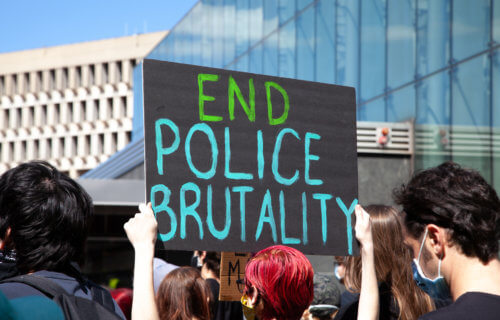BUFFALO, N.Y. — Police brutality is an all-too familiar subject for Americans, with many dying at the hands of law enforcement — including the tragically well-known names of Michael Brown, George Floyd, and Tamir Rice. However, research shows that many survivors who endured violent police treatment struggle with long-lasting consequences such as depression, drugs, and even suicidal thoughts.
A new study led by Christopher Dennison, an assistant professor of sociology at the University at Buffalo College of Arts and Sciences, focuses on the effects of police brutality on more than 12,000 victims. The study includes those who have been stopped or questioned in an unjust manner, as well as those who have been unfairly searched.
Previous studies reveal similar results, however, the data in those examples cover small sample sizes which include specifically chosen people. The results from Dennison’s study support data from the National Longitudinal Study of Adolescent to Adult Health, which reveals these patterns occur globally.
For this latest research, investigators examined how the victims were treated by their parents, the social support each victim received, as well as any early indications of behavioral issues and socio-economic factors. Results indicate that the majority of those unfairly treated by police also suffer from issues like suicidal thoughts, depression, and low self-confidence.
The study also examines these associations with various ethnic groups and each type of race. Results show that the majority of reported cases of police brutality came from black men. However, white men seemed to suffer the lingering effects afterward more so than black men.
“This effect we found among white people could be attributed to evidence suggesting how minority families are socializing their children to prepare for police encounters,” says Dennison, in a statement. “It’s the realization of the ‘experience of the expected hypothesis,’” he says. “For minorities, more generally, there’s a belief that unfair treatment by police will likely happen at some point in their lives, while white people don’t have that expectation. That preparation and lack of preparation might be responsible for the effects we see in this study.”
This study shows that police brutality does not end at the time of the incident. Victims experience lifelong effects that are detrimental to their health. Dennison an expert in life course criminology and social responses to crime, suggests transparency in police-civilian interactions. He also calls for the elimination of certain strategies like the stop-and-frisk.
“The perception of these interactions is certainly consequential,” says Dennison. “The data do not provide context. It asks only if someone has been unfairly treated by police. But context might not matter, because what someone perceives as unfair is indeed consequential.”
Dennison says law enforcement should be made aware of the study results to encourage police officers to be more transparent with civilians as to why they are being questioned or searched. “It’s also important to be aware of how these findings reinforce structural inequalities,” he adds. “These experiences involving police are leaning to the point of being normal and engrained. “That’s alarming and disturbing.”
The study sample includes 20,000 participants and five separate data collections. The first collection was taken in 1994 when all participants were in grades 7-12. Participants and parents answered questions regarding aspects of the participant’s behavior, socioeconomic characteristics, and even family life.
“We controlled for many behaviors that might have generated inaccuracies, and the findings remain robust,” says Dennison. “People who report these kinds of interactions with police were much more likely to experience these detrimental outcomes.”
The findings are published in the journal Criminology.

I need help asap I am a single mom with a son with mental illness was beat ontwo occasions by police officers nothing was done to them it is more to this my son was setup can someone call me anytx to help 423-304-8657 Teresa need phone call email not active